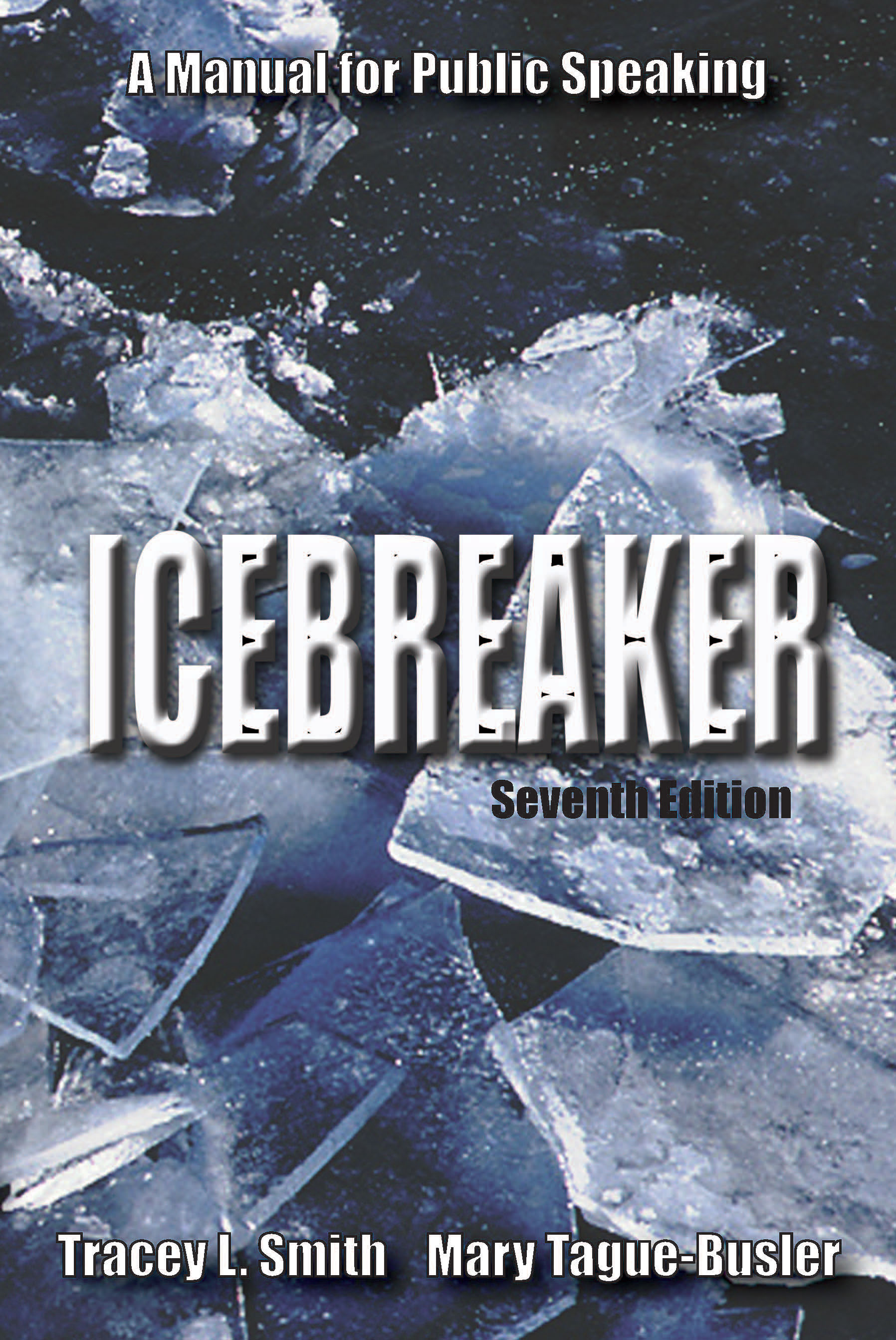“I’ve been unsatisfied with most public speaking texts. They are lengthy, requiring students to read more and practice the skill less. The organization of most texts, however, is what I dislike most. They focus heavily on delivery and overlook the speechwriting process. Icebreaker appears to resist this shallow treatment of speaking, providing students with just the right amount of information on delivery while staying focused on the process of creation.” — Amy Riordan, Bethany College
"Icebreaker alleviates student anxiety over public speaking by empowering them with strategies and ideas for presentation.” —June Rosenberg, Community College of Vermont
“The book is concise, readable, and attractively priced.” —Chris Kennedy, Western Wyoming Community College

203 pages, $30.95 list
1-4786-1556-7
978-1-4786-1556-9
© 2015
paperback
eBook availability
Icebreaker
A Manual for Public Speaking
Seventh Edition
The latest edition of Icebreaker—a practical, hands-on guide to public speaking for those with little or no experience—demonstrates a sequence of nine steps in the speech process: select a general topic, focus your topic, consider your specific purpose, organize your speech, research your topic, create presentation aids, create speech notes, practice, and deliver your speech.
A distinctive series of opening questions reflectively introduce a particular public speaking/oral communication element. From the start, the questions cue readers to focus on key concepts and to watch for answers that lie ahead. “Strengthen Your Skills” exercises help readers practice essential components of public speaking. Discussion questions prompt readers to consider practical and personal applications as well as to gauge comprehension. Icebreaker provides a valuable framework for future speakers to become confident and competent.
A distinctive series of opening questions reflectively introduce a particular public speaking/oral communication element. From the start, the questions cue readers to focus on key concepts and to watch for answers that lie ahead. “Strengthen Your Skills” exercises help readers practice essential components of public speaking. Discussion questions prompt readers to consider practical and personal applications as well as to gauge comprehension. Icebreaker provides a valuable framework for future speakers to become confident and competent.
Reactions
1. Why?
Why Is Communication Important? / Why Do We Need to Study Communication? / Why Is Communication a Process? / Why Use Nine Steps to Prepare a Speech? / Why Do Speakers Make Mistakes? / Conclusion
2. What?
What Do I Know? / What Don't I Know? / What Can I Do to Find a Topic? / What Do I Do Once I Choose One? / What Is the Three-Step Narrowing Process? / Conclusion
3. Who?
Who Is My Audience? / Who Is Listening? / Who Is Having Trouble Listening? / Who Has Poor Listening Habits? / Who Will Understand My Speech? / Who is Experiencing Speech Anxiety? / Conclusion
4. How?
How Do I Begin My Speech? / How Do I Organize My Speech? / How Do I Prepare an Outline? / How Do I Organize My Outline? / How Do I End My Speech? / How Do I Find Facts for My Speech? / How Do I Plan My Research? / How Do I Choose the Best Sources? / How Do I Cite My Sources? / How Do I Make My Speech Better? / Conclusion
5. When?
When Do I Use Notes? / When Do I Practice? / When Do I Deliver? / When Do I Use Verbal Elements? / When Do I Use Nonverbal Elements? / When Do I Answer Questions? / Conclusion
6. Where?
Situations Requiring Information / Situations Requiring Persuasion / Situations Regarding Celebration / Conclusion
7. While
Group Presentations / Conclusion
Final Thoughts
Glossary
Why Is Communication Important? / Why Do We Need to Study Communication? / Why Is Communication a Process? / Why Use Nine Steps to Prepare a Speech? / Why Do Speakers Make Mistakes? / Conclusion
2. What?
What Do I Know? / What Don't I Know? / What Can I Do to Find a Topic? / What Do I Do Once I Choose One? / What Is the Three-Step Narrowing Process? / Conclusion
3. Who?
Who Is My Audience? / Who Is Listening? / Who Is Having Trouble Listening? / Who Has Poor Listening Habits? / Who Will Understand My Speech? / Who is Experiencing Speech Anxiety? / Conclusion
4. How?
How Do I Begin My Speech? / How Do I Organize My Speech? / How Do I Prepare an Outline? / How Do I Organize My Outline? / How Do I End My Speech? / How Do I Find Facts for My Speech? / How Do I Plan My Research? / How Do I Choose the Best Sources? / How Do I Cite My Sources? / How Do I Make My Speech Better? / Conclusion
5. When?
When Do I Use Notes? / When Do I Practice? / When Do I Deliver? / When Do I Use Verbal Elements? / When Do I Use Nonverbal Elements? / When Do I Answer Questions? / Conclusion
6. Where?
Situations Requiring Information / Situations Requiring Persuasion / Situations Regarding Celebration / Conclusion
7. While
Group Presentations / Conclusion
Final Thoughts
Glossary